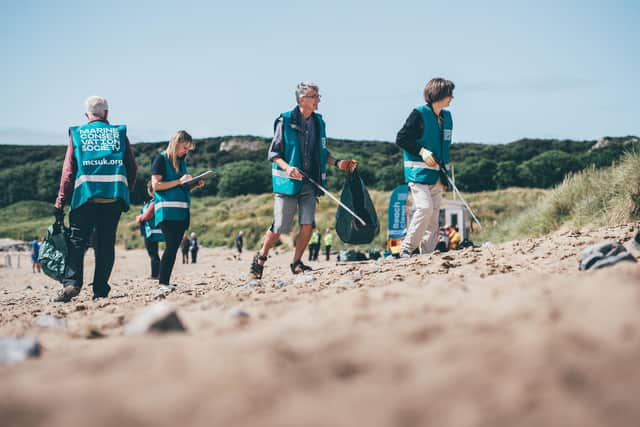Marine Conservation Society's Great British Beach Clean is back for 2022
The charity is calling for volunteers to join them at the coast for a week of beach cleaning and litter surveying.
The Great British Beach Clean, sponsored by Ireland’s number one soup brand, Cully & Sully, is more than just a clean up. Every year volunteers make note of the litter they collect, sharing the data with the Marine Conservation Society’s experts.
Advertisement
Hide AdAdvertisement
Hide AdThe charity has used data collected to campaign for carrier bag charges, single-use plastic bans and, due to start in August 2023, Scotland’s Deposit Return Scheme for bottles and cans.


Last year, volunteers in Scotland collected over two tonnes of litter, with an average of 3.46 items recorded for every metre of beach surveyed across Scotland.
At last year’s Great British Beach Clean, 70 per cent of all litter collected from beaches surveyed in Scotland was made from plastic and polystyrene.
From production to disposal, plastic has a direct impact on the ocean’s capacity to combat the climate crisis.
Catherine Gemmell, Scotland Conservation Officer at the Marine Conservation Society, said: “We need to stop plastic entering our ocean at source by fairly transitioning to a Circular Economy where nothing is wasted and we move to a society of reuse, repair and refill. The Scottish Government is consulting right now on a Circular Economy Bill and the data our volunteers collect is vital evidence used to call for swift and ambitious action.
“Our volunteers have helped provide vital evidence to ban single-use plastic items like cutlery and cotton bud sticks. With 25 wet wipes found on average per 100m of surveyed Scottish beach during the 2021 Great
"British Beach Clean our data is also currently being used to call for a ban on single use plastic wet wipes. We need government to be faster at turning off the single-use tap still pouring into Scottish Seas.”
Dr Laura Foster, Head of Clean Seas at the Marine Conservation Society, said: “Pollution, whether it’s big, small or even invisible, is having a hugely negative impact on our ocean and all those who rely on it – including us.
Advertisement
Hide AdAdvertisement
Hide Ad"Tiny microplastics are being eaten by plankton at the very foundation of ocean ecosystems, animals big and small are being tangled in plastic packaging, turtles are mistaking it for food, and chemical pollution is changing the ocean’s chemistry.
“All of this is an alarming picture of the state of our seas, but each and every volunteer who joins the Great British Beach Clean helps us research the scale of pollution in the UK.
"This research is vital to stop pollution at source, and we know it works. Cleaner beaches will support a healthy ocean, and a healthy planet.”
Cullen Allen (Aka Cully) from Cully & Sully said: “We’re delighted to be part of the Great British Beach Clean 2022. We’ve supported beach cleans in Ireland for the past 4 years and are excited about extending our commitments to the Great British Beach Clean.”
Join the Marine Conservation Society’s Great British Beach Clean at www.mcsuk.org/greatbritishbeachclean.